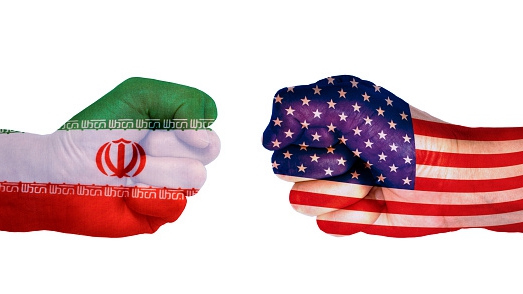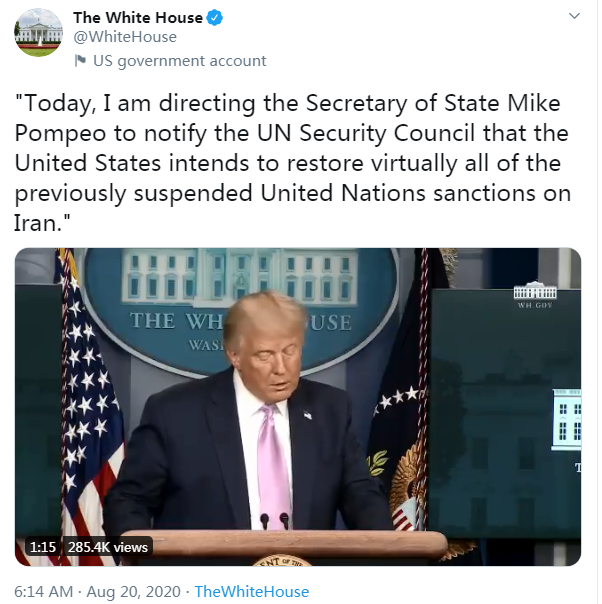
Editor's note: Andrew Korybko is a Moscow-based American political analyst. The article reflects the author's opinion, and not necessarily the views of CGTN.
The planned expiration of the United Nations Security Council (UNSC) arms embargo on Iran this October presents Trump with a convenient opportunity to continue distracting Americans with threats of the "other" so that they pay less attention to his administration's disastrous handling of the COVID-19 pandemic. The U.S. is aggressively arguing that the rest of the world should follow its lead in imposing so-called "snapback sanctions" on the Islamic Republic on the false pretext that Tehran violated the same nuclear deal that Washington itself pulled out of over two years ago.
This is neo-imperialism on steroids for more reasons than just its intent to crush the Iranian economy. The U.S. will more than likely go through with this move unilaterally since it's unrealistic to expect China and Russia to support this form of hybrid aggression against their shared partner. Not only is the move itself illegal in the sense that it blatantly violates international law, but it also speaks to America's arrogance that the fading unipolar superpower still mistakenly believes that it can impose its will on others in today's multipolar world.
Based on the fact that the U.S. threatened to impose so-called "secondary sanctions" on all those who violate its prior unilateral ones against Iran, it can be expected that it'll attempt to do the same this time around too with the "snapback sanctions". Those countries that are most strongly under its influence will probably bend to its demands despite their illegal nature, but China and Russia have no such intentions considering how loudly they're voicing their opposition to the U.S.' plans at the UNSC.
Iran is important for China and Russia because it's an observer in the Shanghai Cooperation Organization (SCO), of which the latter two countries are members. They also appreciate its importance in fighting terrorism in the Middle East. Unlike the U.S., China and Russia don't regard Iran as a threat to regional stability but as an integral component. They believe that unilaterally imposing "snapback sanctions" upon the Islamic Republic will further destabilize the region and worsen the living standards of the Iranian people.

Trump also has more strategic aims in mind than just that and distracting the American people from COVID-19 by over-hypering the false threat that's supposedly posed by Iran. His administration has actively pursued regime change in that country since the moment he entered office, albeit going about it through unconventional ways such as sanctions pressure and fake news allegations about its activities at home and abroad. He hopes that the "snapback sanctions" could inspire another Color Revolution attempt there.
Another point to pay attention to is the international messaging achieved by these aggressive threats. The U.S. wants the rest of the world to think that it's still in charge of global affairs and is capable of leading a coalition of pro-sanctions countries across the world to "isolate" Iran. Washington also wants to portray those that don't follow its demands as "pariah states", which is intended to put more pressure on Beijing and Moscow. What the U.S. hasn't accounted for, however, is how weak and comparatively less influential it's become in recent years.
The U.S. is no longer the world's sole superpower since the emerging multipolar world order that's accelerated by the simultaneous rise of China and Russia made it impossible for Washington to impose its will upon the entire international community like in the decade immediately following the dissolution of the USSR. Nevertheless, its decision-makers are still under the delusion that they continue to rule the world, which is why they're so confident that they'll succeed. As history has recently attested, however, it's assured that they'll fail.
The U.S. hasn't succeeded in "isolating" China on the fake news pretext that it's allegedly responsible for the COVID-19 pandemic, nor has it been able to "contain" the People's Republic in the South China Sea or interfere with the Belt and Road Initiative. The U.S. keeps failing on all international fronts, and even many of its traditional allies, especially those in Europe, are suspicious of its motives and openly refusing to comply with its demands. As such, the more than the U.S. tries to aggressively impose its will on others, the more that it actually ends up isolating itself.
(If you want to contribute and have specific expertise, please contact us at opinions@cgtn.com.)